Advanced Photon Source helps illuminate the journey of a 4 billion-year-old asteroid
Sunday, 25 September 2022 17:32 A year ago, scientists got their first look at material gathered from nearby asteroid 162173 Ryugu. Now the results of those studies have been revealed, and they shed light on the history of our solar system and the long trek of this cosmic wanderer.
At its closest orbit, asteroid 162173 Ryugu is only about 60,000 miles from Earth. That's only a quarter of the distance to the moon. But acc
A year ago, scientists got their first look at material gathered from nearby asteroid 162173 Ryugu. Now the results of those studies have been revealed, and they shed light on the history of our solar system and the long trek of this cosmic wanderer.
At its closest orbit, asteroid 162173 Ryugu is only about 60,000 miles from Earth. That's only a quarter of the distance to the moon. But acc Planetary-scale 'heat wave' discovered in Jupiter's atmosphere
Sunday, 25 September 2022 17:32 An unexpected 'heat wave' of 700 degrees Celsius, extending 130,000 kilometres (10 Earth diameters) in Jupiter's atmosphere, has been discovered. James O'Donoghue, of the Japanese Aerospace Exploration Agency (JAXA), has presented the results this week at the Europlanet Science Congress (EPSC) 2022 in Granada.
Jupiter's atmosphere, famous for its characteristic multicoloured vortices, is a
An unexpected 'heat wave' of 700 degrees Celsius, extending 130,000 kilometres (10 Earth diameters) in Jupiter's atmosphere, has been discovered. James O'Donoghue, of the Japanese Aerospace Exploration Agency (JAXA), has presented the results this week at the Europlanet Science Congress (EPSC) 2022 in Granada.
Jupiter's atmosphere, famous for its characteristic multicoloured vortices, is a Juno will perform close flyby of Jupiter's icy moon Europa
Sunday, 25 September 2022 17:32 On Thursday, Sept. 29, at 2:36 a.m. PDT (5:36 a.m. EDT), NASA's Juno spacecraft will come within 222 miles (358 kilometers) of the surface of Jupiter's ice-covered moon, Europa. The solar-powered spacecraft is expected to obtain some of the highest-resolution images ever taken of portions of Europa's surface, as well as collect valuable data on the moon's interior, surface composition, and ionos
On Thursday, Sept. 29, at 2:36 a.m. PDT (5:36 a.m. EDT), NASA's Juno spacecraft will come within 222 miles (358 kilometers) of the surface of Jupiter's ice-covered moon, Europa. The solar-powered spacecraft is expected to obtain some of the highest-resolution images ever taken of portions of Europa's surface, as well as collect valuable data on the moon's interior, surface composition, and ionos Big planets get a head start in pancake-thin nurseries
Sunday, 25 September 2022 17:32 Super-thin planet nurseries have a boosted chance of forming big planets, according to a study announced this week at the Europlanet Science Congress (EPSC) 2022 in Granada, Spain. An international team, led by Dr Marion Villenave of NASA Jet Propulsion Laboratory (JPL), observed a remarkably thin disc of dust and gas around a young star, and found that its structure accelerated the process of g
Super-thin planet nurseries have a boosted chance of forming big planets, according to a study announced this week at the Europlanet Science Congress (EPSC) 2022 in Granada, Spain. An international team, led by Dr Marion Villenave of NASA Jet Propulsion Laboratory (JPL), observed a remarkably thin disc of dust and gas around a young star, and found that its structure accelerated the process of g ExoClock counts down Ariel exoplanet targets
Sunday, 25 September 2022 17:32 Details of the orbits of 450 candidate exoplanet targets of the European Space Agency's Ariel space mission have been presented this week at the Europlanet Science Congress (EPSC) 2022, and submitted for publication in the Astrophysical Journal Supplement Series. The study, coordinated by the ExoClock (www.exoclock.space) project, has been co-authored by 217 professional and amateur astronomers,
Details of the orbits of 450 candidate exoplanet targets of the European Space Agency's Ariel space mission have been presented this week at the Europlanet Science Congress (EPSC) 2022, and submitted for publication in the Astrophysical Journal Supplement Series. The study, coordinated by the ExoClock (www.exoclock.space) project, has been co-authored by 217 professional and amateur astronomers, Mysterious ripples in the Milky Way were caused by a passing dwarf galaxy
Sunday, 25 September 2022 17:32 Using data from the Gaia space telescope, a team led by researchers at Lund University in Sweden has shown that large parts of the Milky Way's outer disk vibrate. The ripples are caused by a dwarf galaxy, now seen in the constellation Sagittarius, that shook our galaxy as it passed by hundreds of millions of years ago.
Our cosmic home, the Milky Way, contains between 100 and 400 billion st
Using data from the Gaia space telescope, a team led by researchers at Lund University in Sweden has shown that large parts of the Milky Way's outer disk vibrate. The ripples are caused by a dwarf galaxy, now seen in the constellation Sagittarius, that shook our galaxy as it passed by hundreds of millions of years ago.
Our cosmic home, the Milky Way, contains between 100 and 400 billion st mu Space and SpaceBelt to develop constellation for Data-Security-as-a-Service
Sunday, 25 September 2022 17:32 Satellite manufacturer and service provider mu Space Corp and space-based service with secure cloud data storage provider, SpaceBelt have agreed a Memorandum of Understanding entered on the 16 of August 2022. Both parties firmly believe they can bring their own expertise to the project in order for it to succeed and benefit from the collaboration, with plans to have a commercial agreement toward
Satellite manufacturer and service provider mu Space Corp and space-based service with secure cloud data storage provider, SpaceBelt have agreed a Memorandum of Understanding entered on the 16 of August 2022. Both parties firmly believe they can bring their own expertise to the project in order for it to succeed and benefit from the collaboration, with plans to have a commercial agreement toward ATLAS awarded SBIR contract for space domain awareness
Sunday, 25 September 2022 17:32 ATLAS Space Operations, the leading provider of Ground Software as a Service (GSaaS), has announced the award of a Small Business Innovation Research (SBIR) Phase II award to develop their Space Domain Awareness (SDA) capabilities. This effort will use ATLAS software and hardware to increase ATLAS' ability to conduct passive RF observations of on-orbit assets.
To deliver on the milestones
ATLAS Space Operations, the leading provider of Ground Software as a Service (GSaaS), has announced the award of a Small Business Innovation Research (SBIR) Phase II award to develop their Space Domain Awareness (SDA) capabilities. This effort will use ATLAS software and hardware to increase ATLAS' ability to conduct passive RF observations of on-orbit assets.
To deliver on the milestones DART on track for asteroid collision
Sunday, 25 September 2022 14:52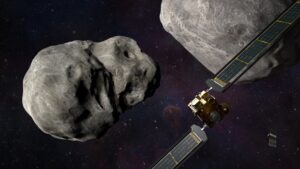
A NASA spacecraft is on course to deliberately collide with a small asteroid Sept. 26 to test how that technique could be used to deflect a potentially hazardous asteroid.
The post DART on track for asteroid collision appeared first on SpaceNews.
NRO satellite flies to orbit in Delta 4’s final West Coast launch
Saturday, 24 September 2022 22:12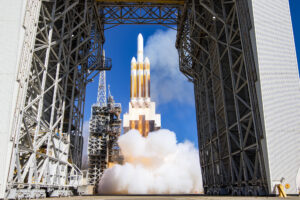
ULA launched a classified National Reconnaissance Office spy satellite on a Delta 4 Heavy rocket September 24 at 3:25 p.m. Pacific from Space Launch Complex-6 at Vandenberg Air Force Base, California.
The post NRO satellite flies to orbit in Delta 4’s final West Coast launch appeared first on SpaceNews.
NASA scraps Tuesday Moon launch due to storm
Saturday, 24 September 2022 15:13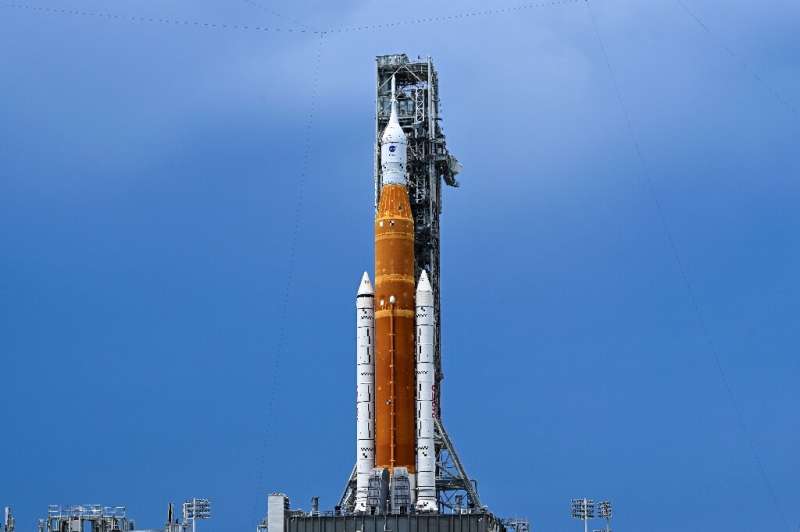
NASA has called off the scheduled Tuesday launch of its historic uncrewed mission to the Moon due to a tropical storm that is forecast to strengthen as it approaches Florida.
After two previously canceled launch attempts, NASA is weighing returning the Artemis 1 mission rocket to its assembly site under the threat of extreme weather.
"NASA is forgoing a launch opportunity... and preparing for rollback (from the launchpad), while continuing to watch the weather forecast associated with Tropical Storm Ian," it said on Saturday.
The US National Hurricane Center (NHC) said Ian is due to "rapidly intensify" over the weekend as it moves toward Florida, home to the Kennedy Space Center, from which the rocket is set to launch.
NASA postpones Artemis 1 launch because of tropical storm
Saturday, 24 September 2022 15:05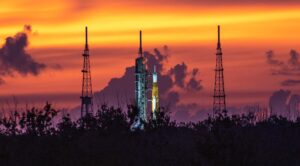
NASA has called off plans to attempt to launch the Artemis 1 mission on Sept. 27 as a tropical storm, with the potential to become a major hurricane, heads for Florida.
The post NASA postpones Artemis 1 launch because of tropical storm appeared first on SpaceNews.
Neptune and rings shine in photos from new space telescope
Saturday, 24 September 2022 13:40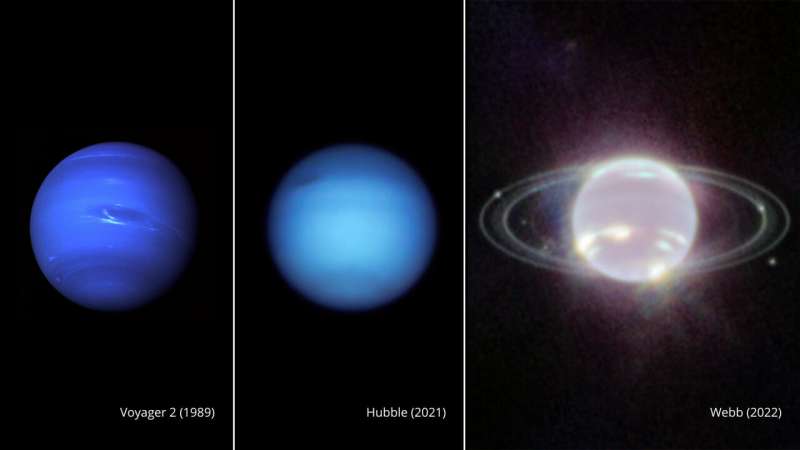
Approaching storm may delay launch try for NASA moon rocket
Friday, 23 September 2022 18:49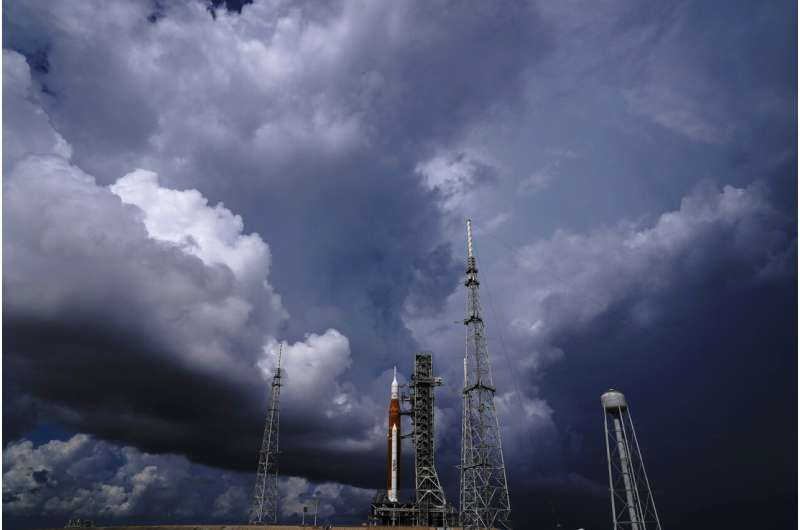
An approaching storm threatens to delay NASA's next launch attempt for its new moon rocket, already grounded for weeks by fuel leaks.
Avanti turns to regional operator partnerships to expand satellite coverage
Friday, 23 September 2022 17:49
U.K.-based Avanti Communications is seeking more partnerships to grow its footprint after securing its first major deal to use another regional satellite operator’s capacity.
The post Avanti turns to regional operator partnerships to expand satellite coverage appeared first on SpaceNews.

